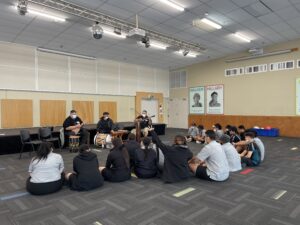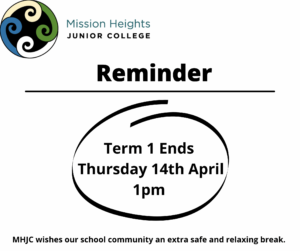Today, all Year 7 students at MHJC walked down to the Fo Guang Shan Buddhist Temple. Students participated in a morning of cultural learning and sharing. A fabulous tradition for MHJC students and our wider community.

Today, all Year 7 students at MHJC walked down to the Fo Guang Shan Buddhist Temple. Students participated in a morning of cultural learning and sharing. A fabulous tradition for MHJC students and our wider community.

We would like to extend an invitation to all our 2021 Graduates to attend an afternoon tea on Thursday 26th May from 4-6pm in the MHJC gym. Unfortunately, due to covid, our graduating class of 2021 was not able to have the typical graduation ceremony and dinner. This time together on May 26th will enable us to farewell the 2021 graduating class and share stories/photos of their time at MHJC.
We ask members of the 2021 graduating class to RSVP using the link below. Dress code for this event is new school uniform or smart casual.
We look forward to seeing you!

Every Wednesday, for the next 20 weeks, our Pasifika students will have the opportunity to experience and learn about Pasifika drumming. Today was their first session. What great music! More to come as this programme progresses.


Samara Ndoro (10F2) and Faazil Muhammed (7F1) presented their Anzac poetry at the War Memorial Museum on Anzac morning. Both students spoke beautifully. There were 3 divisions – under 12 years old, 12 to 17 years old, and 18 years old and over. Three winners in each division shared their work. It was excellent to see MHJC values in action with students ‘Growing their Greatness’ amongst other North Island finalists.

I wish everyone a day free of worry, a day free from considering the horrors of war. It is hard to imagine what it must be like to experience a reality which includes the imminent prospect of death and destruction when we have not personally witnessed it. That is why we must, at least for a moment, pause and reflect on what it must have been like for so many of our forefathers who paid the ultimate sacrifice to preserve peace and freedom for future generations.
It is also important to spare some time to consider those still affected by war. Refugees displaced by fighting, innocent civilians caught in the crossfire, and of course those who serve who continue to die or bear horrific wounds, seen and unseen.
Finally it falls on our shoulders to ensure that war does not become the only option to settle differences. It is sad to witness the conflict in Ukraine and wonder how the world can still stumble into conflict with the horrifying consequences and geopolitical scars that might take generations to heal. An absence of genuine dialogue, understanding and respect leads to misinformation, mistrust and misunderstanding. These are the conditions for conflict and those we strive to avoid.
We often recite the poem titled “Lest we forget”. These words could not be more appropriate today.

A reminder to our community that the last day of Term is next Thursday 14th April. School will be finishing at 1pm. We wish our community a relaxing break.

Our ‘MHJC Term 1 Newsletter 2022’ has now been sent out to our community and can be found linked below. We would like to thank everyone for a fantastic start to the school year and we wish our community a wonderful final week of term and break!
